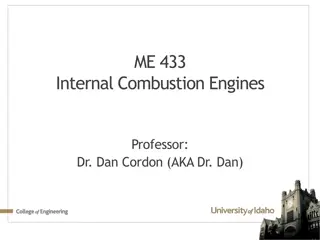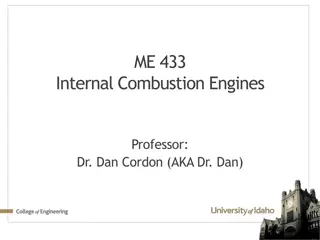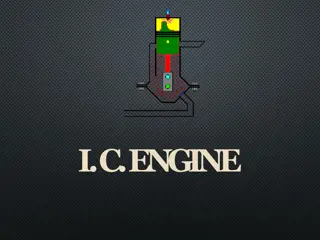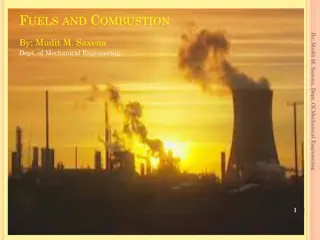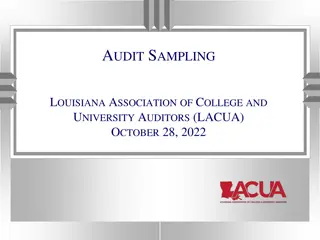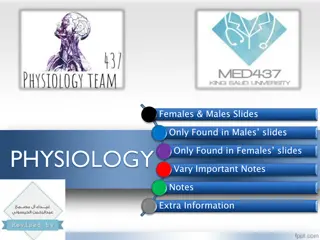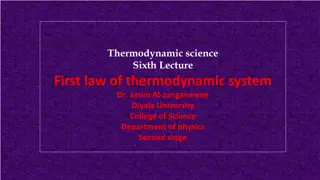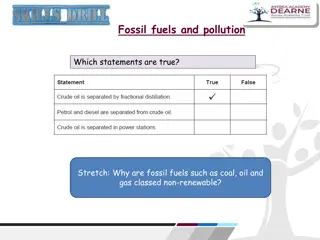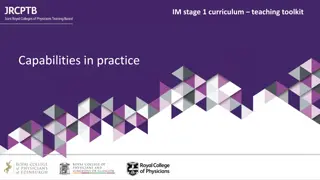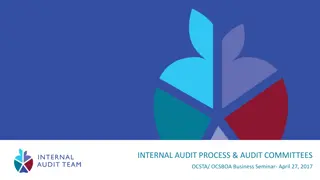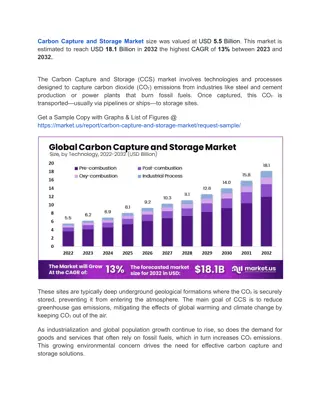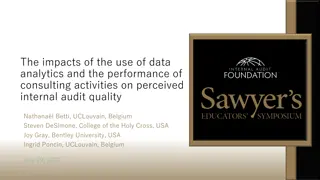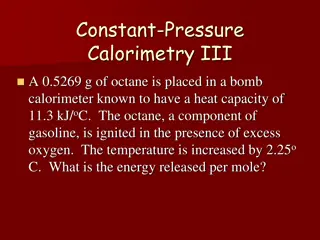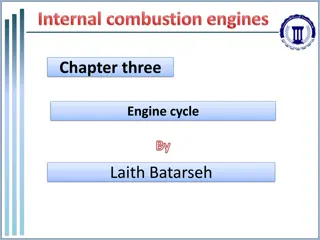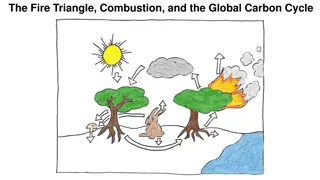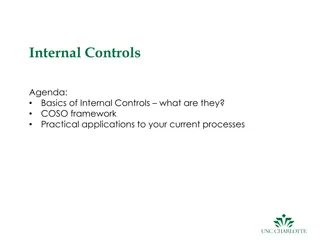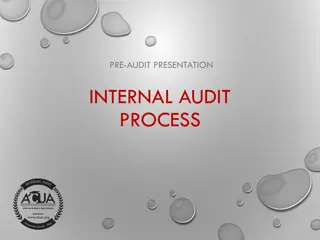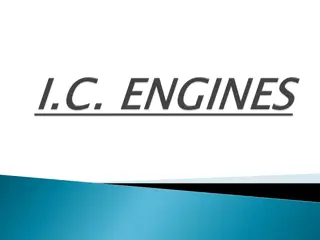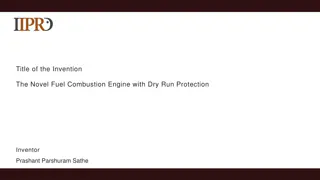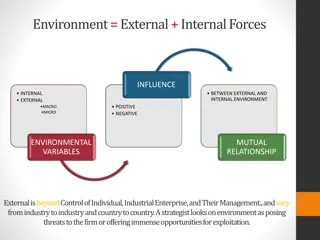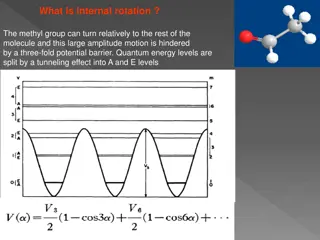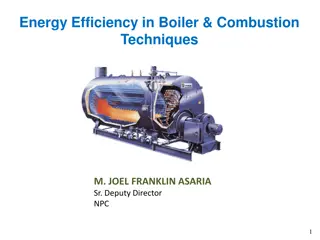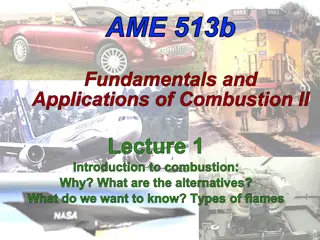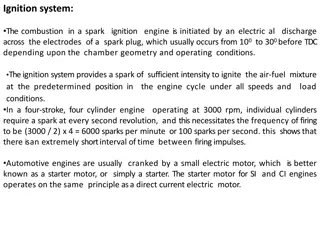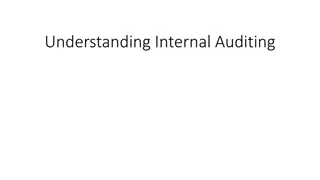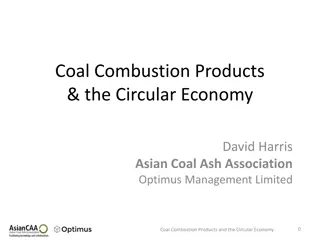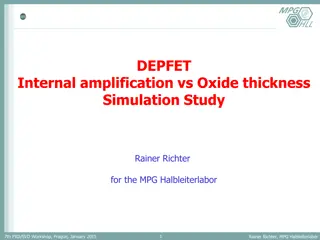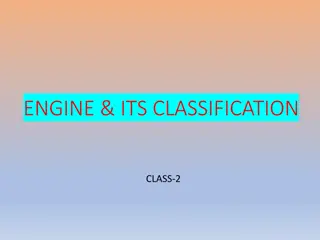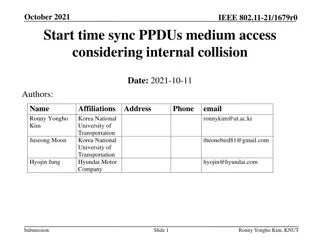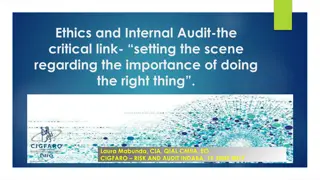Advancements in Hydrogen Combustion for Internal Combustion Engines
Exploring the utilization of hydrogen as a sustainable fuel for internal combustion engines, this research delves into the mixing, combustion, and particulate formation processes in H2ICE. Discussions cover the benefits of hydrogen, challenges faced, and innovative solutions like onboard on-demand h
0 views • 21 slides
Exploring Hybrid Auditing Methods in Corporate Governance
Project led by Gunilla Eklöv Alander delves into assessing security in corporate governance without an internal audit function. The study examines various professions contributing to digitalized internal control environments and analyzes the traditional division of responsibilities between internal
2 views • 8 slides
Understanding Fuel Chemistry in Internal Combustion Engines
Fuel chemistry knowledge is crucial for internal combustion engines for various reasons such as determining air-fuel ratios, ensuring efficient combustion, preventing detonation, and optimizing power output. Balancing chemical equations, calculating specific volume for mixtures, and analyzing first
10 views • 19 slides
Understanding Mean Effective Pressure in Internal Combustion Engines
Mean Effective Pressure (MEP) is a crucial parameter in internal combustion engines, representing the average pressure exerted on the piston during the power stroke. MEP is relatively consistent for specific engine types, making it a useful predictor of torque output based on engine type and displac
10 views • 20 slides
Electric powertrain
The Electric Powertrain Market investigates the global shift towards electric propulsion systems in vehicles. It analyzes trends in electric motors, batteries, and power electronics driving the transition from internal combustion engines to electric powertrains.
0 views • 7 slides
Understanding Internal Combustion Engines: A Comprehensive Overview
Explore the intricate world of Internal Combustion Engines (I.C. Engine), including their classification, components, terminology, and operation cycles. Delve into the various types, arrangements, and applications of I.C. engines, from automobiles to aircraft engines, and uncover the key principles
1 views • 25 slides
Exploring Fuels and Combustion in Mechanical Engineering
This content delves into the intricate world of fuels and combustion, discussing classifications, properties, and origins of various fuels such as solid, liquid, and gaseous. It covers the importance of desirable fuel properties, caloric values, and the different types of natural and artificial fuel
0 views • 34 slides
Audit Sampling Guidelines and Reference Materials for Internal Auditors
Review authoritative guidance for audit sampling and the potential for external auditor reliance on internal auditors. Understand and apply concepts related to audit sampling to project results with certainty. Available reference materials include AICPA Codification of Statements, AICPA Audit Guide,
6 views • 114 slides
Understanding Homeostasis: Maintaining Internal Balance in the Body
The concept of homeostasis is crucial for understanding how the body maintains a stable internal environment despite external fluctuations. This presentation covers the definitions of positive and negative feedback mechanisms, components of feedback loops, and the role of homeostatic mechanisms in p
0 views • 33 slides
Understanding the First Law of Thermodynamics in Science Lectures
Explore the concept of the First Law of Thermodynamics through a series of engaging science lectures by Dr. Jasim Al-zanganawee from Diyala University. Learn about energy transfer, conservation, internal energy of ideal gases, and how heat and work impact a system's total energy. Discover the relati
0 views • 15 slides
Understanding Fossil Fuels and Pollution: A Comprehensive Overview
Fossil fuels such as coal, oil, and natural gas are non-renewable energy sources that release heat energy when burned, but also contribute to pollution when not burned completely. This leads to the release of harmful pollutants like carbon dioxide, carbon monoxide, sulfur dioxide, and carbon particu
2 views • 9 slides
Internal Medicine Stage 1 Curriculum Teaching Toolkit: Capabilities in Practice
Capabilities in Practice (CiPs) describe the professional tasks within the scope of internal medicine, utilizing expert assessors for assessment validity. There are 14 CiPs as learning outcomes for internal medicine Stage 1, with descriptors, performance levels, and evidence for entrustment decision
0 views • 11 slides
Internal Audit Process & Audit Committees Overview
Explore the functions and responsibilities of internal audit processes and audit committees in the context of school boards in Ontario. Covering topics such as governance, risk management, compliance, and internal controls, the content delves into the structure, mandate, and activities of internal a
2 views • 34 slides
High Costs and Safety Issues Challenge Carbon Capture and Storage Adoption
Carbon Capture and Storage Market By Technology (Pre-combustion, Post-combustion, Oxy-combustion, and Industrial Process), By End-Use Industry (Power Generation, Oil & Gas, and Other End-Use Industries), By Region and Companies \u2013 Industry Segmen
0 views • 4 slides
Impact of Data Analytics and Consulting Activities on Internal Audit Quality
This research examines how the use of data analytics and consulting activities affect perceived internal audit quality. The study investigates the relationship between these factors and top management's perception of internal audit quality. Through online scenario-based experiments with middle and t
2 views • 11 slides
Understanding Calorimetry and Enthalpy Changes in Chemistry
This content explores various concepts related to calorimetry, enthalpy changes, and Hess's Law in the field of chemistry. It covers topics such as energy released in combustion reactions, heat capacity, phase changes, and the application of Hess's Law in determining enthalpy changes. Enthalpy value
0 views • 17 slides
Understanding Engine Cycle Analysis
The engine cycle analysis delves into the intricate processes within a combustion chamber, simplifying the complex interactions of air, fuel vapor, and exhaust gases. Idealized assumptions help analyze the constant-pressure intake, compression, and expansion strokes, along with the combustion proces
1 views • 48 slides
Republic of South Africa (RSA): COSO Components 2 & 3 with 3 Lines of Defence Approach
The presentation delves into RSA's approach to the COSO components, focusing on Risk Assessment and Internal Controls. It discusses the legislative mandate, Treasury regulations, and the COSO Internal Control Integrated Framework. The Risk Assessment section covers levels, matrices, and key instrume
0 views • 13 slides
Understanding the Fire Triangle, Combustion, and the Global Carbon Cycle
This series of images explores the concepts of the fire triangle, combustion, and the global carbon cycle. It delves into the role of oxygen, fuel, and heat in combustion processes, leading to the production of carbon dioxide, water, heat, and light. The images further illustrate the chemical proces
1 views • 12 slides
Understanding Internal Controls and the COSO Framework
Internal controls play a vital role in organizations, providing reasonable assurance on achieving objectives. The COSO framework outlines the five integrated components of internal control, emphasizing the importance of control environment, risk assessment, control activities, information, and monit
1 views • 18 slides
Maximizing Biomass Sector Growth in Namibia through Thermal Processing Technologies
The Namibia Biomass Research Symposium 2023 emphasizes the potential of the Namibian biomass sector in igniting growth through thermal processing of encroacher bush-based biomass. With vast untapped biomass stocks and a focus on thermochemical and direct combustion technologies, the symposium highli
0 views • 12 slides
Understanding Internal Audit and Controls Process
This content provides an overview of the pre-audit presentation, objectives of the presentation, the definition of internal audit, the role of internal audit in examining university departments, the university audit process, internal audit reporting lines, and insights on internal controls in an org
3 views • 30 slides
Overview of Internal Combustion Engines and Their Components
Internal combustion engines are devices that convert fuel's chemical energy into thermal energy, which is then used to produce mechanical work. The engines can be classified into two types - External Combustion Engines and Internal Combustion Engines. Internal combustion engines include components l
2 views • 53 slides
Internal Audit Department Overview
The Internal Audit Department at the University of North Carolina Charlotte is led by Chief Audit Officer Jennifer Walker and Internal Audit Manager Kevin Vehar. The team provides risk-based assurance, advisory services, and investigations to enhance organizational value. Their mission is to offer o
1 views • 17 slides
Understanding Small Gasoline Engine Performance
This chapter explores the intricacies of measuring and optimizing internal combustion engine performance, focusing on calculating functional horsepower through various formulas and measurements. It delves into the combustion process in a small gasoline engine, detailing how the air/fuel mixture igni
0 views • 66 slides
Understanding the Components and Operation of Internal Combustion Engines
Dive into the world of internal combustion engines through a detailed exploration of their classification, key components like cylinders, pistons, crankshafts, and crankcases, as well as the operational principles of four-stroke engines. Discover how these engines work, their construction, and the r
2 views • 103 slides
Novel Fuel Combustion Engine with Dry Run Protection
This invention by Prashant Parshuram Sathe addresses the crucial issue of preventing damage to fuel combustion engine pumps caused by dry running. The innovative mechanism stops fuel flow in the absence of fluid, preventing overheating and damage. Investing in this technology at an early stage offer
0 views • 10 slides
Understanding the Differences in Smoke Colors - Exploring the Science behind Black, Grey, and White Smoke
Smoke color can vary based on what is being burned, the level of combustion, and various other factors. Black smoke often indicates incomplete combustion of heavy materials, while grey smoke signals the fire settling down. White smoke is common at the start of a fire or with lighter fuels. By studyi
0 views • 11 slides
Understanding the Impact of Internal Environment Components on Business Decisions
The internal environment of a business is influenced by factors like value systems, vision, management structure, internal power relationships, and human resources. These components have a direct impact on decision-making processes and organizational performance. By analyzing and understanding these
1 views • 32 slides
Insights into Internal Rotation in Molecules
Internal rotation in molecules, such as the methyl group in acetaldehyde and methyl acetate, involves large amplitude motions hindered by potential barriers. Quantum energy levels split due to tunneling effects, impacting rotational and torsional energy levels. Theoretical models like the Rho Axis M
0 views • 6 slides
Energy Efficiency in Boiler & Combustion Techniques
This article discusses energy efficiency in boiler systems and combustion techniques, covering topics such as boiler types, classifications, specifications, and applications. It explains the process of heat generation through fuel combustion, transfer to water for steam production, and highlights va
0 views • 70 slides
Fundamentals of Combustion II - Introduction and Nomenclature
This lecture introduces the fundamentals of combustion by discussing reasons for studying combustion, alternative energy sources, and what we aim to understand. It covers different types of flames and provides a comprehensive nomenclature summary for the course, including various parameters and thei
0 views • 32 slides
Understanding the Ignition System in Internal Combustion Engines
The ignition system in spark ignition engines initiates combustion through electric discharge across the spark plug electrodes. It ensures proper ignition timing for efficient engine operation at various speeds and loads. Modern ignition systems include battery, magneto, and electronic ignition type
0 views • 21 slides
Understanding Internal Auditing: Role and Importance
Internal Audit Department exists to provide independent assurance, consulting services, and improve operations by evaluating risk management, internal controls, and governance processes. It reports to the campus president and the Director of System-wide Internal Audit at TBR while serving the colleg
0 views • 7 slides
Partnership Internal Communications Plan & Stakeholder Analysis
Developing an effective internal communications plan for a partnership involves drawing insights from stakeholder analysis, drafting, validating, and implementing the plan. Engaging with internal stakeholders, understanding their awareness, engagement levels, and expectations, and prioritizing commu
1 views • 6 slides
Coal Combustion Products & the Circular Economy - Addressing Resource Flow Challenges
This discussion delves into the intersection of coal combustion products and the circular economy, emphasizing the need for continuous re-evaluation of resource chains, ecosystem metabolisms, and industrial innovations to ensure sustainable environmental practices and economic growth. Exploring the
0 views • 24 slides
DEPFET Internal Amplification vs. Oxide Thickness Simulation Study by Rainer Richter
The study explores the behavior of DEPFET internal amplification in comparison to oxide thickness through simulations conducted by Rainer Richter at the MPG Halbleiterlabor workshop. It delves into the differences in behavior between DEPFET and classical MOS transistors, shedding light on the reason
0 views • 11 slides
Understanding Engine Classification and Design
Engine classification involves categorizing engines based on various factors such as combustion type, number of strokes, cylinder design, and ignition method. Common classifications include external and internal combustion engines, as well as categories based on the design and use of the engine. Add
0 views • 11 slides
Understanding Start Time Sync Procedures in IEEE 802.11-21/1679r0
In the document authored by Ronny Yongho Kim et al., the focus is on start time sync PPDU medium access considering internal collision in IEEE 802.11-21/1679r0. It discusses the importance of defining a clear rule to resolve internal collision cases during medium access procedures. Specific attentio
0 views • 9 slides
Importance of Ethics in Internal Audit Practices
Ethics play a crucial role in internal audit, ensuring good governance, trust, and accountability. This article explores the definition of ethics, ethical culture, the IIAs Code of Ethics for Internal Auditors, and the significance of upholding ethical standards in conducting internal audit work.
0 views • 52 slides


